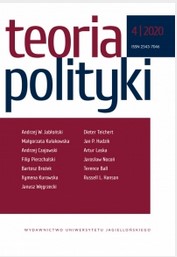Original Intent and Popular Government: A Madisonian Perspective
Original Intent and Popular Government: A Madisonian Perspective
Author(s): Russell L. HansonSubject(s): History of Law, Constitutional Law, Political history, Government/Political systems, Politics and law, 18th Century
Published by: Wydawnictwo Uniwersytetu Jagiellońskiego
Keywords: popular sovereignty; compact theory of ratification; broad construction; strict construction; interposition; nullification;
Summary/Abstract: In 1791 two former political allies reached opposite conclusions on the constitutionality of chartering a national bank to serve the Federal government of the United States. Alexander Hamilton, who was then Secretary of the Treasury, argued that the U.S. Constitution conferred limited, but essentially bottomless, powers to Congress in pursuit of the public good. James Madison, at that time an elected member of the U.S. House of Representatives, argued that powers conferred on Congress were limited in number, and reach, by conventions that ratified the Constitution in 1787–1788. Hamilton won the battle on the bank, but lost the war, as Madison’s strict construction of the Constitution in terms of the understanding of those who ratify, and amend, it prevailed in the long run. The broad construction favored by Hamilton has rarely carried the day in American jurisprudence.
Journal: Teoria Polityki
- Issue Year: 2020
- Issue No: 4
- Page Range: 217-240
- Page Count: 24
- Language: English

